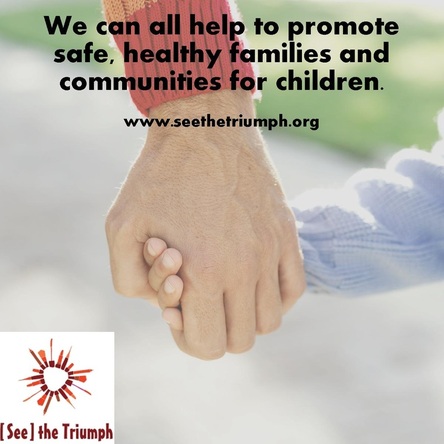|
By Christine Murray, See the Triumph Co-Founder
All this month, we’ve focused on parenting toward nonviolence. We couldn’t let this month end without addressing an important topic about children and violence. Today we’re focusing on how children are impacted when they experience domestic violence in their homes, and what steps can be taken to ensure that children are safe and supported. When children witness domestic violence in their homes, they face many potential challenges that may occur throughout their lives. There are many ways that children can be impacted when they’re living in a violent home. According to the New Hampshire Coalition Against Domestic Violence, these include being abused themselves in addition to witnessing violence, being used as part of abuse tactics the abuser uses, and by making it more difficult for the parent victim to parent effectively. Would you know the signs to indicate that a child you know has experienced domestic violence in their home? The organization, Children of Domestic Violence, provides a useful chart that shows that the indicators can show up in many ways in children’s lives, including their behaviors, emotions, and social relationships. In many jurisdictions, children witnessing domestic violence is considered a form of neglect and is required to be reported to Child Protective Services. The US Department of Health and Human Services, through its Child Welfare Information Gateway, provides a useful resource for understanding the laws in your area. It’s important for professionals and community members to know and understand their legal obligations, as well as resources for helping to support the children in their lives who’ve been impacted by domestic violence. My colleagues and I in the Family Violence Research Group at the University of North Carolina at Greensboro recently developed a safety planning resource, Safety Strategies, for professionals to use when working with clients impacted by domestic violence. We based this resource on a series of 9 focus groups that we conducted with professionals in domestic violence agencies to learn about safety risks and safety planning related to domestic violence. We heard some great information from the professionals in our focus groups that help us understand how to think about children’s safety in the context of domestic violence. First, the professionals reminded us that it’s important for parents (and other adults) ultimately to be responsible for children’s safety. Young children especially should not be expected to keep themselves safe. However, it’s possible to do some basic safety planning with children to help them learn ways to become safer if violence occurs. This safety planning must be done in a developmentally-appropriate manner, using words and behaviors that match the child’s capabilities and understanding of the situation. Some of the strategies that adults can review with children include how to call 9-1-1 and developing a code word or sign to let neighbors or others know that they need help. It’s also important to help children connect with adults and friends with whom they can talk and share their feelings. This may be a non-offending parent, an extended family member, a teacher, neighbor, coach, or other trusted adult. Children also may benefit from counseling, especially play therapy, to help them process their emotional responses to the domestic violence. Children who have experienced violent homes need a lot of support and resources, including positive, trusting relationships with supportive adults, opportunities to be involved in activities where they can discover their strengths, connections with peers and community organizations, and relationships in which they can tell their stories and feelings. We can all help to promote safe, healthy families and communities for children. If you’re interested in learning more, I encourage you to connect with our partner, the Stop Abuse Campaign, in their campaign to give children the right to a safe home to grow up in. Comments are closed.
|
Archives
July 2024
CategoriesAll About Intimate Partner Violence About Intimate Partner Violence Advocacy Ambassadors Children Churches College Campuses Cultural Issues Domestic Violence Awareness Month Financial Recovery How To Help A Friend Human Rights Human-rights Immigrants International Media Overcoming Past Abuse Overcoming-past-abuse Parenting Prevention Resources For Survivors Safe Relationships Following Abuse Schools Selfcare Self-care Sexual Assault Sexuality Social Justice Social-justice Stigma Supporting Survivors Survivor Quotes Survivor-quotes Survivor Stories Teen Dating Violence Trafficking Transformative-approaches |
Search by typing & pressing enter



 RSS Feed
RSS Feed